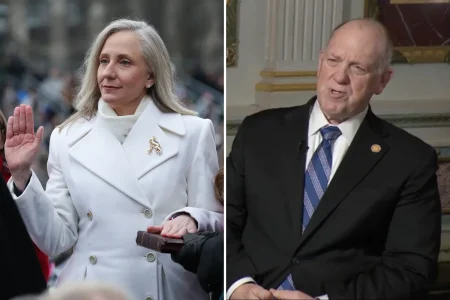Diplomatic Tensions Rise as Trump Threatens Aid Cuts, Petro Condemns Maritime Actions
Transatlantic Relations Strained by Political Rhetoric and Policy Disputes
In a significant development that threatens to reshape U.S.-Colombian relations, former President Donald Trump has announced his intention to cut American aid to Colombia, marking a potential shift in decades-long bilateral cooperation. This declaration comes amid escalating verbal confrontations with Colombia’s President Gustavo Petro, whose journey from leftist guerrilla fighter to head of state represents the profound political transformation in one of America’s most steadfast Latin American allies. The diplomatic tension reached new heights when President Petro characterized certain U.S. maritime military operations as “murder,” language that has sent shockwaves through diplomatic channels and raised concerns about the future of security cooperation between the two nations.
The threat of aid reduction carries significant implications for Colombia, which has historically been one of the largest recipients of U.S. assistance in the Western Hemisphere. For decades, American funding has supported crucial initiatives ranging from counter-narcotics operations to economic development projects, humanitarian assistance, and peace-building efforts following Colombia’s historic 2016 peace accord with FARC rebels. Analysts estimate that U.S. aid to Colombia has exceeded $12 billion since the inception of Plan Colombia in 2000, making it a cornerstone of bilateral relations. The potential withdrawal or significant reduction of this support comes at a particularly challenging time for Colombia, as the nation continues to grapple with implementing peace accords, addressing ongoing security challenges from remaining armed groups, and managing the Venezuelan migration crisis that has brought over two million refugees across its borders.
Historical Context and Evolving Relations Between Traditional Allies
The relationship between the United States and Colombia has traditionally transcended partisan politics in both nations, with successive American administrations—both Republican and Democratic—maintaining strong support for Colombia’s security and development objectives. This bipartisan consensus has been built around shared interests in combating drug trafficking, promoting regional stability, and advancing democratic governance. However, President Petro’s election in 2022 represented a historic shift in Colombian politics, bringing to power a former member of the M-19 guerrilla movement who has advocated for significant revisions to Colombia’s approach to issues like drug policy, economic development, and international relations. His victory marked the first time Colombia elected a leftist president, signaling voters’ desire for change after decades of conservative and center-right governance that closely aligned with Washington’s regional objectives.
President Petro’s criticism of certain U.S. naval operations as “murder” reflects his administration’s more assertive stance on sovereignty issues and human rights concerns—a position that resonates with his political base but creates friction with Washington. The specific maritime actions in question involve U.S. interdiction efforts targeting drug trafficking vessels in international waters, which have long been a component of bilateral counter-narcotics cooperation. Petro’s characterization suggests a fundamental disagreement about the legitimacy and proportionality of these operations, highlighting ideological differences that were less pronounced under previous Colombian administrations. This rhetoric represents a departure from Colombia’s traditionally cautious diplomatic approach toward its northern partner and principal security benefactor, potentially signaling a recalibration of the relationship under Petro’s leadership.
Economic and Security Implications of Changing Aid Relationships
The economic ramifications of reduced U.S. assistance would be substantial for Colombia’s development trajectory. American aid currently supports diverse programs addressing rural development, alternative crop production for former coca farmers, judicial reform, human rights initiatives, and environmental protection in the Amazon region. A significant funding reduction would force difficult prioritization decisions and potentially jeopardize progress in these areas. Beyond the direct financial impact, such a move could also send negative signals to international investors who view strong U.S.-Colombia relations as an indicator of stability and favorable business conditions. Colombian officials have privately expressed concern that diminished American engagement could undermine investor confidence at a time when Petro’s government is already facing economic headwinds, including currency volatility, inflation pressures, and the challenge of implementing ambitious social programs without disrupting fiscal stability.
From a security perspective, the consequences could be equally profound. Colombia continues to face threats from armed groups including ELN rebels, FARC dissidents who rejected the peace process, and criminal organizations competing for control of lucrative drug trafficking routes. U.S. intelligence sharing, equipment, training, and operational support have been vital components of Colombia’s security strategy. Military and police officials in Bogotá worry that scaling back this cooperation could create vulnerabilities that armed groups would exploit, potentially reversing security gains achieved at great human and financial cost over the past two decades. Additionally, reduced counter-narcotics funding could impact Colombia’s ability to control coca cultivation and cocaine production, which have already shown troubling increases in recent years according to United Nations monitoring.
Diplomatic Efforts and Potential Paths Forward
Despite the provocative rhetoric from both sides, diplomatic channels remain active as officials work to prevent further deterioration in bilateral relations. Career diplomats in Washington and Bogotá have emphasized the deep institutional ties that exist between agencies, militaries, and civil society organizations in both countries—connections that have weathered previous political disagreements. Colombian Foreign Minister Álvaro Leyva has engaged in quiet diplomacy with the U.S. State Department, seeking to contextualize Petro’s statements while reaffirming Colombia’s commitment to constructive dialogue on areas of disagreement. Similarly, the U.S. Ambassador to Colombia has maintained regular communication with Petro’s administration, focusing on the substantial shared interests that continue to unite the two nations despite current tensions.
The path forward will likely involve calibrated compromises from both sides. For Colombia’s part, this may mean moderating rhetorical criticisms while still pursuing policy adjustments that reflect its new political direction. For the United States, maintaining engagement despite ideological differences would preserve influence and protect long-term strategic interests in a region where China and Russia have actively expanded their presence. Congressional stakeholders who have traditionally championed U.S.-Colombia cooperation have initiated bipartisan discussions about sustaining critical assistance programs regardless of executive branch tensions, recognizing that abrupt aid reductions could undermine American objectives related to regional stability, migration management, and counter-narcotics efforts. Veteran diplomatic observers suggest that the relationship may ultimately evolve toward a more balanced partnership that accommodates Colombia’s political evolution while preserving cooperation on mutually beneficial priorities.
Regional Implications and Global Context of the Diplomatic Rift
This bilateral tension unfolds within a broader regional context of changing political alignments across Latin America, where several countries have elected left-leaning governments in recent years. The outcome of the U.S.-Colombia diplomatic standoff will be closely watched by neighboring nations as a potential indicator of Washington’s approach to ideological diversity in its traditional sphere of influence. Brazil, Mexico, Chile, and other countries with progressive administrations have demonstrated varying degrees of solidarity with Petro while maintaining their own pragmatic engagement with the United States. Regional organizations including the Organization of American States and the recently reinvigorated Community of Latin American and Caribbean States (CELAC) may provide forums for multilateral discussion of the principles at stake in this bilateral dispute.
From a global perspective, the friction between Washington and Bogotá creates potential openings for external powers seeking greater influence in Latin America. China has already positioned itself as Colombia’s second-largest trading partner and has expressed interest in expanding infrastructure investment under its Belt and Road Initiative. Russia has similarly indicated willingness to enhance security cooperation with Latin American partners seeking to diversify their international relationships. European nations, particularly Spain and Germany, have worked to position themselves as balanced partners that can maintain productive relationships with Colombia regardless of its domestic political orientation. As Colombia navigates this challenging diplomatic terrain, President Petro faces the complex task of delivering on his promises of social transformation and more independent foreign policy while not sacrificing the concrete benefits of close cooperation with the hemisphere’s dominant power. The resolution of this tension will significantly influence Colombia’s development trajectory and America’s standing in a region undergoing profound political realignment.







